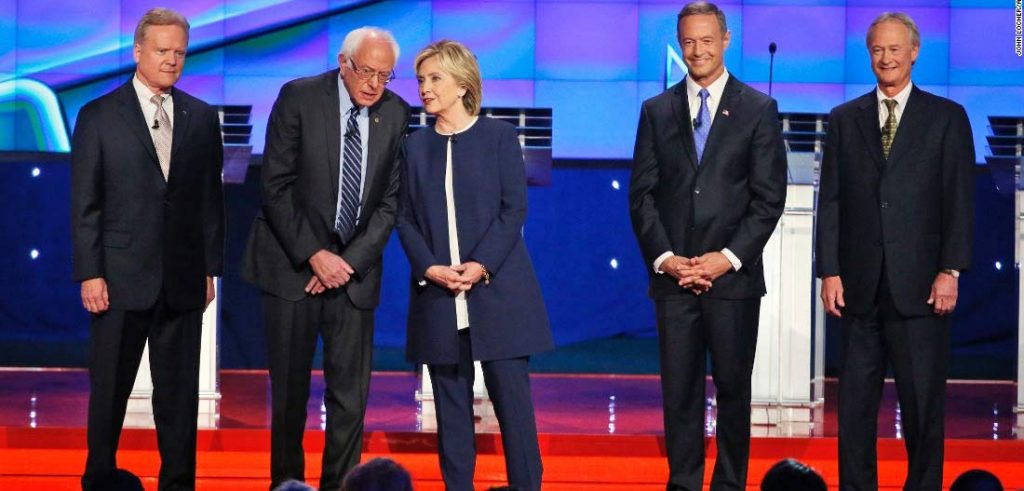The Center on National Security at Fordham Law is fact checking national security-related claims made during the debates running up to the 2016 U.S. Presidential Election. Last night, Democratic hopefuls faced off in a debate in Las Vegas.
❶ Sen. Bernie Sanders (I-VT) suggested that he had predicted in 2002 much of the “destabilization” that followed the American invasion of Iraq. “And I say, without any joy in my heart, that much of what I thought would happen about the destabilization, in fact, did happen,” he said.
Q: Did Sen. Sanders actually predict such “destabilization” before the U.S. went to war with Iraq?
A: Yes. Explaining his opposition to the Iraq War Resolution in 2002, Sanders, then a member of the House of Representatives, said he was worried about the “unintended consequences” of the forthcoming U.S. invasion, particularly that it could lead to a civil war in Iraq and the ascendance of extremist regimes in the region. He also agreed with the notion that the war would “seriously jeopardize, if not destroy, the global counterterrorist campaign we have undertaken.”
❷ Secretary Hillary Clinton said Tuesday night that the United States is “already flying [combat missions]in Syria just as we are flying in Iraq.”
Q: Is the United States already flying combat missions in Syria?
A: Yes. In total the U.S. has conducted 2,642 strikes in Syria, according to Centcom. Coalition nations conducting airstrikes in Iraq include: the United States, Australia, Canada, France, Jordan, Netherlands and the United Kingdom. Coalition nations conducting airstrikes in Syria include: the United States, Australia, Bahrain, Canada, France, Jordan, Saudi Arabia, Turkey and the United Arab Emirates.
❸ Secretary Hillary Clinton repeated her support for a no-fly zone and suggested that several countries would be willing to participate in its enforcement. (“What I believe and why I have advocated that the no-fly zone—which of course would be in a coalition—be put on the table is because I’m trying to figure out what leverage we have to get Russia to the table,” she said.)
Q: Are other countries willing to enforce the no-fly zone?
A: Yes, a few. Some countries, including Turkey, have said they are willing to help enforce a no-fly zone. Russia, however, is opposed to the proposal on the grounds that it would violate Syrian sovereignty and would not comply with the UN Charter and international law. According to military experts, the sophistication of the Syrian air defense and Russia’s introduction of air-to-air combat aircraft make the establishment of no-fly zone “impossible” without Russian cooperation.
President Obama has repeatedly rejected calls by the Syrian opposition for the United States to enforce a no-fly zone in Syria. Some reports have suggested that Ankara’s decision to grant the U.S. access to the Incirlik airbase was made on the assumption that Washington would do so. French officials, meanwhile, have reportedly considered the proposal while German Chancellor Angela Merkel has warned that a no-fly zone could put Syrian civilians at greater risk.
❹ Sen. Bernie Sanders (I-VT) claimed Tuesday night that “virtually every telephone call in this country ends up in a file at the NSA.”
Q: Are U.S. citizens’ emails and phone calls under NSA surveillance?
A: In a sense. The U.S. government is able to compel large telecom companies to turn over the metadata—location called, time of call, length of call, chronology of calls—of millions of phone calls in the United States, which potentially gives the government access to a huge amount of personal information about American citizens. But the sunset of the Patriot Act ended the program—known as Section 215—under which this bulk collection takes place and a short term extension of the program is scheduled to expire on November 29. Prior to Congress’s ending the program, the Second Circuit Court of Appeals declared the program illegal.
❺ Secretary Hillary Clinton asserted that Edward Snowden “could have gotten all of the protections of being a whistleblower.”
Q: Were whistleblower options available to Snowden?
A: No, they were not. President Obama has said that the former NSA contractor could have used whistleblower protections instituted by an executive order to raise his concerns regarding the NSA’s bulk collection program. The protections, however, did not apply to intelligence contractors, as the New York Times’ Editorial Board has pointed out. Additionally, even if Snowden had been a full time employee of the NSA, the Whistleblower Protection Act does not apply to employees of the FBI, CIA, NSA, or any agency whose focus is on counter-intelligence and foreign intelligence activities.
❻ Anderson Cooper, one of CNN’s debate moderators, alleged that President Obama recently said that the investigations into Secretary Clinton’s use of a private email server while at the State Department were “legitimate issue[s].”
Q: Did President Obama say the email scandal was a “legitimate” issue?
A: Yes, but with a major caveat. In an interview with CBS’ “60 Minutes” last Sunday, President Obama said that Secretary Clinton had made a “mistake,” but stopped short of characterizing it as one that jeopardized national security. “I can tell you that this is not a situation in which America’s national security was endangered.”
❼ Secretary Hillary Clinton claimed that the Select Committee on Benghazi is “basically an arm of the Republican National Committee.”
Q: Are the congressional investigations into the September 2012 Benghazi attacks politically motivated?
A: Probably, according to recent revelations. Rep. Kevin McCarthy (R-CA) as Majority Leader of the House of Representative made recent statements linking the drop in Clinton’s polling numbers to the work of the Benghazi Committee, though House Republicans have since distanced themselves from McCarthy’s comments. A former committee staffer has recently come forward with claims that he was fired from the committee for resisting the overtly political direction the committee has taken.

